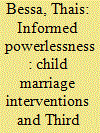| Srl | Item |
| 1 |
ID:
168482


|
|
|
|
|
| Summary/Abstract |
Child marriage has gained increased international prominence over the past decades. Organisations working with the issue have promoted empowering girls as the best strategy to address it. Informed by postcolonial feminist theory, this article will locate these discourses in broader ‘turn to the girl’ and ‘turn to agency’ in international development, analysing how Third World girlhood, agency, resistance and voice are conceptualised. Girls are constructed as threatened by their families and communities, with agency exercised through resistance and materialised by their voice. I argue that this ignores the complexity of decision-making processes and broader structural factors related to child marriage, so that interventions providing ‘empowerment-as-information’ for girls to be agents of change instead leave them in a state of informed powerlessness.
|
|
|
|
|
|
|
|
|
|
|
|
|
|
|
|
| 2 |
ID:
193144


|
|
|
|
|
| Summary/Abstract |
In this article, we examine the Hungarian and Turkish responses to the EU’s handling of the 2015 refugee “crisis” through a postcolonial feminist IR framework. Drawing on hypermasculinity, we argue that both countries utilise migration to overcome their postcolonial and masculine anxieties by confronting their positions within the international hierarchies. Our examination of policy statements and speeches by Viktor Orbán and Recep Tayyip Erdoğan between 2015 and 2016 reveals three masculinised responses. First, both leaders portray themselves as acting out of paternal authority, while painting the EU as weak or inhumane. Second, they depict the EU as incompetent and their countries as competent providers of security. Third, they present themselves as protectors of European values, and the EU as in need of protection. These rhetorics suggest that both leaders used the “crisis” to challenge the current international hierarchy. Despite this, we argue that they are only concerned with their countries’ rankings within the hierarchy, not the system itself. Our postcolonial feminist reading of the “crisis” reveals that these masculinised framings are in fact counterproductive and only serve to confirm both Hungary and Turkey’s positions at the bottom of the international hierarchies, and their subordination to the EU as the EU’s others.
|
|
|
|
|
|
|
|
|
|
|
|
|
|
|
|